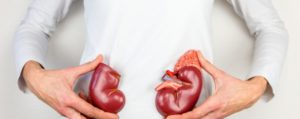 HYANNIS – Picture your kidneys as your body’s ultimate purification system. They filter all of your blood, every 30 minutes, eliminating waste and extra water, 24 hours- a-day, 365 days per year for your entire lifetime.
HYANNIS – Picture your kidneys as your body’s ultimate purification system. They filter all of your blood, every 30 minutes, eliminating waste and extra water, 24 hours- a-day, 365 days per year for your entire lifetime.
When insults like diabetes and smoking can take their toll on these important organs, leading to problems.
Chronic kidney disease occurs when your kidneys begin to lose function over time, according to the National Institutes of Health (NIH). It is estimated approximately 30 million people in the United States have chronic kidney disease and most are undiagnosed according to the Centers for Disease Control and Prevention (CDC).
Kidney diseases are the ninth leading cause of death.
“The most common cause of chronic kidney disease in the United States is diabetes,” said Melanie Greenan, MD, a nephrologist with Cape Cod Healthcare. “The other main contributors are blood pressure, high cholesterol and smoking.”
When the kidneys become damaged and filter less waste products and toxins, these changes can have an impact on other functions.
Chronic kidney disease (CKD) can lead to the following, according to NIH:
High blood pressure, which can be a cause and a result of CKD
Heart disease
Stroke
Anemia
Bone disease
Malnutrition
“The goal with chronic kidney disease is for the kidneys to work as well as possible for as long as possible,” said Dr. Greenan.
Preventing Kidney Disease
Here are five ways to keep your kidneys healthy, according to Dr. Greenan:
Keep your blood pressure under control.
Keep blood sugars under control, if you have diabetes.
Maintain a healthy weight.
Keep cholesterol under control. The plaque that builds up in the heart arteries is the same substance that builds up in the kidney arteries.
If you smoke, stop!
Chronic kidney disease is progressive and having patients’ old medical records to view when she first sees them in consultation is very helpful, according to Dr. Greenan.
“Kidneys have their own pattern of decline,” she said. “What I look at when I review the records is not only how their kidneys are working now but how that has changed over time. They may be in the same place they were 10 years ago and nobody mentioned it or it’s getting worse month-by-month.”
There are five stages of CKD and each indicates how well the kidneys are working. Blood work for diagnosis includes the Glomerular Filtration Rate (GFR). The GFR indicates the rate that the kidneys filter waste and how it relates to how your kidney is functioning, overall.
Treatment – Dialysis
End stage renal disease, (ESRD) is the final stage of kidney disease when the kidney function is between 10-15 percent. This is the beginning of the conversation about dialysis, which is a treatment that uses a filter and hemodialysis machine to remove waste products, extra salt and water. It does what the kidneys can no longer do.
“When you hit a GFR of below 15, you would be considered to be in (ESRD), Stage V kidney failure,” said Dr. Greenan. “As some people get older, I find some of them can tolerate lower numbers of 4, 5 or 6 percent before they start feeling sick. If they aren’t feeling sick then we don’t make them go on dialysis because it is a big change in quality of life and lifestyle.”
Once you decide on dialysis, you are on it the rest of your life, according to Dr. Greenan. “Dialysis is four hours of treatment three times a week.”
David, 78, (who requested that his last name not be used) started dialysis a few months ago. He has had kidney disease for a couple of years with no problems and does not have family history of it or diabetes.
Prior to starting dialysis, he had been ill a few months and, following the first of two stays in the hospital, his kidney function started to decline.
“Three months after that, I got really sick and was back in the hospital,” said David. “My kidneys were failing.”
He said his GFR was down to nine and he decided with Dr. Greenan to start dialysis. “I’m feeling much better. The day after dialysis, I feel like a million bucks.”
While the goal is to avoid dialysis, if possible, people can live on it for decades, said Dr. Greenan.
Patients who need dialysis can receive it at one of the two Fresenius Care dialysis units, one in Mashpee and the other in Yarmouthport.
























